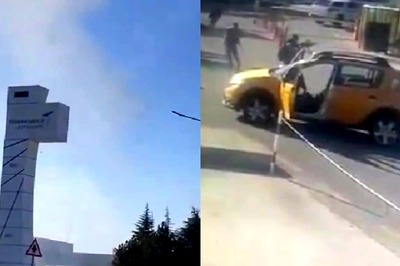
views
BANGALORE: Nasal bleed is an alarming condition, seen especially in children during dry climatic conditions. There are two types of nasal bleeds - ‘Anterior Bleed’, where blood flows out from the front of the nose and the other ‘Posterior Bleed’, where bleeding is from back of the nose to the throat. The later is rarer, but more dangerous.The main causes for nasal bleed are nose picking, minor nasal injuries, violent nose blowing, severe common cold, nasal obstruction and sinusitis. They can also be due to bleeding disorders, high blood pressure, tumours in the nose or sinuses and rarely problems in blood vessels. People taking medication to delay blood clotting as well as those with liver diseases, blood related disorders like leukaemia will also be very prone to this medical condition.In case of anterior nasal bleed one can try first aid measures like making the patient sit up with head bent slightly forward and pinching of the nose using thumb and index finger for a stretch of five minutes. (Common home remedy of applying ice pack is controversial, with many medical practitioners questioning its effectiveness.) If bleeding persists after four or five cycles of pinching the nose, medical help has to be sought. The commonest site of nose bleed is the front aspect of the central partition of the nose (called ‘nasal septum’). Initial management includes saline nose drops, water soluble gels and creams and use of humidifiers especially at night to prevent dryness and crusting in the nose. In case of recurrent bleeding, one has to get the bleeding vessels cauterized either chemically or with electric cautery.In cases of posterior bleed, which is commonly seen in elderly people with uncontrolled BP, medical attention is required immediately because the blood loss is more profuse. However, others may not see the amount of blood lost since patient will be swallowing the blood knowingly or unknowingly. The normal approach will be to pack the nose to stop bleeding. If the bleeding is severe, and not controlled with pressure dressings, the blood vessels will have to clipped or ligated. At times blocking of bleeding vessels (embolisation) could be required. Nasal bleed is a scary and messy condition, but most often it is not as dangerous as it seems if managed appropriately. Do's* Keep finger nails of children clipped* In case of posterior bleed, seek medical assistance immediately* In case of active bleed do ‘pinching of nose’* Open mouth when sneezing (but cover mouth with kerchief) and ibuprofen, unless medically advised Dont’s* Restrict nose picking habit* Do not violently blow nose* Avoid smoking (it dries the nose)* Do not use medications that increases bleeding, such as aspirinDr Bathi Reddy, HOD and Consultant, ENT Department, Manipal Hospital, Bangalore.


















Comments
0 comment